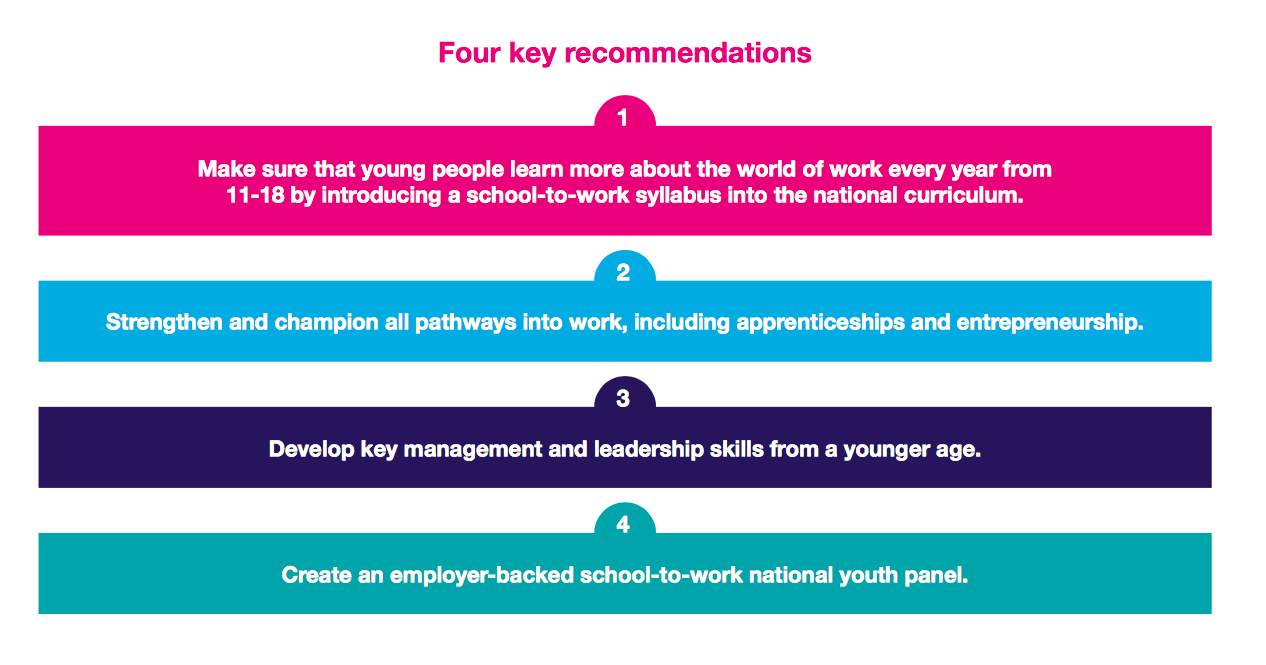How to give our young people the skills for work [new UK-wide initiative]
 Troubling new EY Foundation data reveals employers’ concerns about the next generation’s skills, and proposes a national School to Work programme
Troubling new EY Foundation data reveals employers’ concerns about the next generation’s skills, and proposes a national School to Work programme
Matt Scott
Fifty per cent of small and medium-sized companies think that young people do not have the core non-technical skills needed for entry-level jobs, according to a new survey by the EY Foundation and the School to Work Campaign.
The report, A Framework for Success, Connecting Young People with Employers from School to Work, found that young people were found to be lacking in skills such as working as part of a team, problem-solving, resilience, the ability to communicate, organisational skills and punctuality.
#SCHOOLTOWORK
To help address this problem, CMI and the EY Foundation are calling on employers and schools to back a “School to Work” programme to give young people fairer access to workplace opportunities and to improve their employability on leaving school, including providing young people in the UK with the right support to ensure they have the best working prospects.
The School to Work Framework would mean young people aged nine to 18 would learn essential core workplace skills in the classroom and during work experience. They would also learn about the diversity of jobs, the requirements and ways to get them as well as local opportunities for employment.
The new findings mirror the 2016 report by CMI and the EY Foundation, Age of Uncertainty: Young people’s views on the challenges of getting into work in 21st Century Britain, which found that more than half (56%) of young people said they find it difficult to get the experience needed for their desired careers, with one in three (32%) not confident they will be able to find a job in the next few years.
Speaking at today’s launch, Petra Wilton, director of strategy for CMI, said: “We welcome the timely launch of the School to Work campaign. Young people aspire to become leaders but it’s currently luck of the draw whether they get the necessary chances to learn how.
“We need employers and educators to help the next generations to develop practical skills from a younger age. This includes making management and leadership skills part of the school curriculum so that employers can recognise their capabilities.”
Maryanne Matthews, chief executive of the EY Foundation, added: “We know from our programmes that disadvantaged young people in particular miss out on support to develop the skills, knowledge and meaningful work experience necessary to get the jobs they want.
“An accredited UK-wide School to Work Framework that is part of the curriculum would mean every young person, regardless of their background, would get a real chance to get the skills they need for the jobs they want and employers would have a source of skilled workers.”
The School to Work programme is also launching a national youth panel, backed by the Confederation of British Industry, to help shape the curriculum so that it reflects the views of young people. The framework will be piloted next year and will undergo regular evaluation as it is developed to make sure it addresses the concerns of young people, employers and schools and colleges.
Addressing concerns about an age of uncertainty
The 2016 CMI/EY Foundation Age of Uncertainty report was based on a survey of 1,510 16 to 21-year-olds in the UK and conducted by Populus. It found a worrying and steady decline in school-secured work experience. Of those surveyed, just 51% of 16 to 18-year-olds said that their school offers work experience, compared to 64% of those now aged 19 to 21.
School-leavers contributing to the report said that a lack of connections, combined with poor visibility of local employers, was behind the drop in work experience opportunities, with almost nine in 10 (88%) saying employers should be doing more to provide such work experience placements.
Louise Coles, aged 18 and from the north-east, said: “It’s really hard to get good-quality work experience when you don’t have the connections, and even harder if you don’t know the options available to you. I believe that we need to remove these barriers for all young people.
“We need more information, more paid work experience and fairer application processes [for work experience].”
The Age of Uncertainty report recommended including accredited practical management skills in the national curriculum for 11-18-year olds to provide young people with the practical skills needed to boost employability.
Get involved with the debate: @cmi_managers @EY_Foundation #schooltowork

Press & Media Enquiries
For more information or to request interviews, contact CMI's Press Team on 020 7421 2705 or email press.office@managers.org.uk



